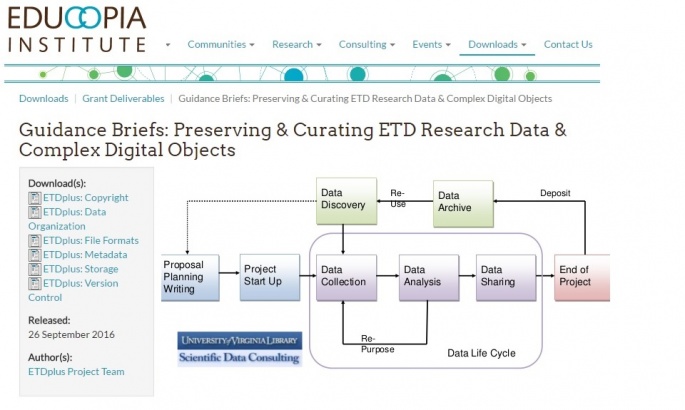ETDplus project : towards reliably preservation of Electronic Theses and Dissertations
23/11/2016


ETDplus (2014-2017) builds on the momentum of the Lifecycle Management of ETDs project to research and build tools to promote best practices and to increase the capacity of academic libraries to reliably preserve Electronic Theses and Dissertations (ETDs).
_____________________________________________________________________________________________________
The ETDplus project* was launched in 2014 to develop research and build tools (i.e. a toolkit of guidelines, educational materials, and a set of software tools) to help manage a growing challenge in ETDs programs.
Ranging from research data sets to video installations, from websites to music recitals, ETDs - as digital objects - are pieces of intellectual work that cannot be captured in words alone. The project is helping institutions ensure the longevity and availability of ETD research data and complex digital objects (e.g., software, multimedia files) that comprise an integral component of student theses and dissertations.
In September 2016, a set of six Guidance Briefs: Preserving & Curating ETD Research Data & Complex Digital Objects was published. These open documents are ready to be adopted and adapted for local use by institutions to help students understand how to prepare, manage, and store the research files associated with their ETDs.
The six Guidance Briefs are short (3-4 page) “how-to” oriented briefs:
- ETDplus: Copyright
- ETDplus: Data Organization
- ETDplus: File Formats
- ETDplus: Metadata
- ETDplus: Storage
- ETDplus: Version Control
In addition to providing actionable, easy-to-follow advice about how to organize, store, and protect their research files, these Guidance Briefs help students recognize how their own content management practices will impact the credibility, replicability, and long-term accessibility of their findings: knowledge and skills that will impact the health of their careers for years to come.
A forthcoming workshop series featuring these Briefs and geared toward student audiences will also be available to ETD programs in early 2017.
The Guidance Briefs (as Word or RTF documents) are openly editable documents under a CC BY 4.0 license and can downloaded at the following website.
The project team invites institutions to use and reuse these in whatever ways work best for their local audiences. Each Brief includes generally applicable information about its topic, and also includes a “Local Practices” section that an institution should use to call attention to what’s happening on its own campus.
If you have any further questions about the Guidance Briefs or about the ETDplus project, don't hesitate to reach out to:
Katherine Skinner, Principal Investigator
Sam Meister, Co-Principal Investigator
Courtney Vukasinovic, Administrative Coordinator
* The ETDplus project is generously funded by the Institute of Museum and Library Services (IMLS) and led by the Educopia Institute, in collaboration with Confederation of Open Access Repositories, Educopia Institute, bepress, Carnegie Mellon University, Colorado State University, Indiana State University, Morehouse School of Medicine, Oregon State University, Penn State University, Purdue University, ProQuest, University of Louisville, University of North Carolina School of Library and Information Science, University of North Texas, University of Tennessee Knoxville, and Virginia Tech University.
Source: EDUCOPIA - Guidance Briefs
Might also be of your interest:
- Data Management for Agriculture: Archiving & Preservation (resources and tips for managing agricultural and environmental data)
- DCC Curation Lifecycle Model
- 23 Things for Research Data Management
- New Research Data Curation Bibliography released by Digital Scholarship
- Data Curation Network: discussing and providing solutions for data issues in a collaborative way
